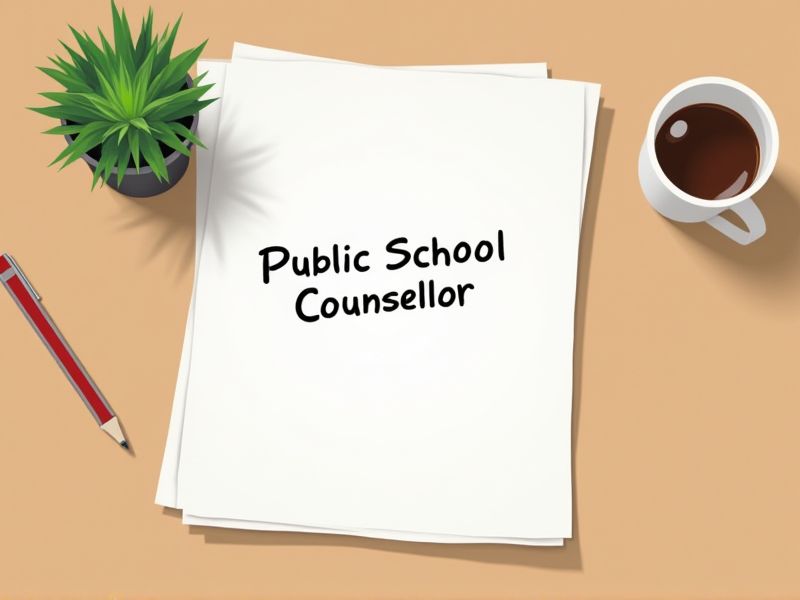
Public school counselors play a critical role in guiding students through academic, social, and emotional challenges. Certifications validate their expertise, ensuring they are equipped with the necessary skills to address diverse student needs. The educational landscape demands counselors who are proficient in various intervention and support strategies. Here are some important certifications you might need as a public school counselor.
State School Counselor Certification (K-12)
State School Counselor Certification (K-12) is needed because it ensures that counselors have met specific educational and professional standards established by the state. This certification provides school counselors with the necessary skills to effectively support the academic, career, and social-emotional development of students. Without proper certification, counselors may lack the formal training required to address the diverse needs of a public school population. Certification fosters accountability by ensuring that counselors adhere to a standardized code of practice, ultimately enhancing the quality of support provided to students.
School Counseling Provisional License
Public schools require a School Counseling Provisional License to ensure counselors meet baseline educational and ethical standards set by educational authorities. This licensing helps maintain consistency in counseling practices across different schools, ensuring that all students receive quality support. A provisional license allows entry-level counselors to gain necessary supervised experience in real-world settings, bridging the gap between academic preparation and full professional practice. Without such a license, schools might struggle to verify a counselor's qualifications, potentially compromising student well-being and educational support.
National Certified School Counselor (NCSC)
NCSC certification for public school counselors ensures they are equipped with nationally recognized standards and best practices, enhancing their effectiveness in supporting students. With this credential, counselors demonstrate a commitment to ongoing professional development and adherence to ethical guidelines. Having certified professionals improves the overall quality of the counseling programs in public schools, directly impacting students' academic and emotional well-being. The certification provides a framework for accountability, ensuring that counselors meet a consistent level of competence across different educational settings.
Crisis Intervention Certification
Crisis intervention certification equips public school counselors with essential skills to address emergencies effectively, enhancing student safety and well-being. Training in crisis response protocols helps counselors identify and de-escalate potential threats, minimizing harm in critical situations. Certification ensures counselors adhere to standardized practices, promoting consistency and confidence in crisis management. Schools benefit from certified counselors as they can foster a secure environment conducive to learning and student support.
Trauma Informed Care Certification
Trauma Informed Care Certification equips public school counselors with essential skills to recognize and address the effects of trauma on students, promoting healthier learning environments. Exposure to trauma can significantly hinder a student's academic performance and social interactions; certified counselors can implement strategies to mitigate these impacts. This certification also fosters trust and safety between students and educators, encouraging open communication and support. With growing awareness of mental health issues, informed counselors can better advocate for necessary resources and interventions within the school system.
Mental Health First Aid Certification
Growing awareness of mental health issues among students has led to increased demand for counselors possessing mental health first aid certification, as it equips them with necessary skills to identify signs of mental distress early. Schools have reported higher rates of mental health challenges among students, which affects academic performance and overall well-being. This certification enables counselors to act swiftly and effectively in crisis situations, potentially preventing escalation. As mental health support becomes pivotal in educational settings, certified counselors provide a crucial bridge to professional mental health services.
Suicide Prevention Certification
Suicide rates among adolescents have been rising, necessitating school counselors to have specialized skills for early intervention. Certified counselors better identify warning signs, facilitating timely support for at-risk students. Informed intervention strategies reduce long-term psychological consequences and improve student safety. Certification equips counselors with the latest research and methods, enhancing their ability to foster a supportive environment.
Multicultural Counseling Certification
Multicultural Counseling Certification equips public school counselors with the skills needed to effectively support a diverse student population. With growing cultural diversity in schools, counselors must understand different cultural backgrounds to address students' unique emotional and educational needs accurately. This certification enhances counselors' ability to foster an inclusive school environment, reducing the risk of cultural misunderstandings or biases. It ensures that counselors can implement culturally responsive strategies, promoting equity and improved student outcomes.
Child Abuse Recognition and Reporting Certification
Child abuse recognition and reporting certification equips public school counselors with essential skills to identify signs of abuse, ensuring early intervention. This certification ensures counselors adhere to legal mandates, promoting a standardized approach to managing suspected abuse cases. Properly certified counselors foster trust among students, creating a safer school environment. Training in this area enhances collaboration with child protection agencies, which increases the effectiveness of intervention efforts.
Ethical Standards in Counseling Certification
Adherence to ethical standards ensures that public school counselors maintain professional integrity, fostering trust among students, parents, and school staff. It helps in protecting students' rights and confidentiality, crucial for creating a safe and supportive educational environment. Ethical standards provide a framework for decision-making, guiding counselors in navigating complex situations responsibly. Implementing these standards aids in maintaining a consistent quality of care and accountability across all public schools.
Summary
As a reader considering the impact of certifications for public school counselors, you can expect enhanced counseling services due to their upgraded skills. Counselors with certifications tend to implement evidence-based practices more effectively, thereby improving student outcomes. Schools may also benefit from increased credibility and trust in their counseling programs, which can lead to better community support. These factors combined often contribute to a more positive and supportive educational environment.
